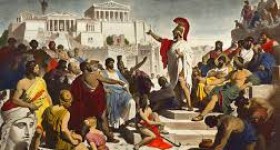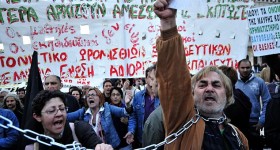Direct Democracy in Athens, ancient and modern
Last night I was checking my twitter account, when the most amazing message appeared on screen. “50.000 Greeks obstructed the exits of the Greek parliament at Syntagma square and did not allow the members of the parliament to leave the building”. Similar messages continued throughout the night. Eager to find out more details on the subject I turned on the Greek tv. The silence of the traditional media was deafening. Not a single channel reported the news. In the meantime, twitter live stream was buzzing with updates. I tuned into #syntagma #greekrevolution #m25gr to learn more about current events in Athens.
For those of you who have not been informed of the news, a political revolution is taking place in the cradle of democracy. Since last week dozens of thousands of people gather around the boule (the modern Greek parliament) to protest against the economic measures imposed by the IMF, to disapprove of corrupt politicians and to ask for a better future. The call for such protests came through Facebook and twitter. No political party can claim the organisation of this crowd. The gathering in several squares in Athens and other Greek cities seems to be spontanteous. In a matter of days the unlikely crowd organised itself into committees responsible for the cleaning of Syntagma square (both literally and metaphorically speaking), legal advice, medical aid, food provision etc.
Above all, we witnessed the establishment of an open Assembly. During the first day, no more than 100-200 people attended the talks. A week later, though, more than 2-3 thousand citizens become involved daily at the procedures. The Assembly is organised in a way that promotes Direct Democracy, according to the ancient Athenian model (in general terms). Everyone who wishes to speak is allowed to take the stand for no more than 3 minutes. Several attendants keep records of what has been said, while fellow twitterers report on the results. After only a few days of talks the same themes seem to be emerging. The protesters ask for 1) an official rejection of the imposed economic measures, 2) punishment of the politicians who have stolen the money, 3) a restriction of parliamentary service to 8 years and 4) Direct Democracy.
The Greeks are turning back to centuries of democratic tradition in an attempt to reconstruct the ancient model of popular government. Whether it will be successful or not is irrelevant. What matters is that the current government and the traditional consider the movement dangerous. Why else would they suppress such significant news? On the other hand, the devotees of social media continue disseminating significant information from the Athenian political front.





It is amazing how people reacted to the policy of the governement and the impudence of the members of the parliament. It is very true that the gathering of the people was spotaneous and peaceful. Children, teenagers, adults and pensioners demonstrated that the only thing left is their decency. However, it is not true that there was nothing on TV about it. In most of the channels the event was mentioned, described and intepreted. It should be noted that lots of people have camped in Syntagma square, declaring that they would not leave until the demands will be satisfied. And something else. These kind of gatherings did not only took place in Athens but also in Thessaloniki and other Greek cities and towns.
Thanks for reporting on this. I knew nothing about it until I saw your tweets yesterday, presumably because of the absence of media coverage. Obviously direct democracy isn’t really a long-term solution for a modern nation with a population of the size that Greece has, but this is a great example of how it can work successfully in a small and highly-engaged group. I take my hat off to these protesters for making it work so successfully for them, and for providing a functioning alternative model for comparison with the state parliament – not to mention one with such patriotic resonance! I really hope that their actions lead to at least some improvement in the official democratic process in Greece.
Even more amazing is the structure of the Assembly. They seem to be facing the usual problems of a crowd that does not belong in one political party, e.g. Diversity of ideas and aims. The solution is to treat everyone equally. The speakers are chosen by lot! (Does it remind you of something). Also the listeners are not alowed to approve or disapprove loudly. I am keeping track of this extraordinary political experiment for future research reference!
Did not Ancient Democratic Athens not appoint dictators at times of crisis ?. “Direct Democracy, according to the ancient Athenian model” did not mean votes for all. In ancient Athens you had to earn the right to vote either by been wealthy or by earning citizen ship in wars or by service to the state & of course no woman. ?
The Romans appointed dictators in time of crisis. You are right about the exclusive character of direct democracy, though.